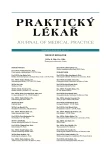Psychosocial care of women after perinatal death
Authors:
K. Ratislavová 1; J. Beran 2; L. Kašová 1
Authors‘ workplace:
Západočeská univerzita v Plzni, Fakulta zdravotnických studií, Děkan: doc. MUDr. Luboš Holubec, CSc.
1; Fakultní nemocnice v Plzni, Psychiatrická klinika, Přednosta: doc. MUDr. Jiří Beran, CSc.
2
Published in:
Prakt. Lék. 2012; 92(9): 505-508
Category:
Of different specialties
Overview
The stillbirth rates or early neonatal death in the Czech Republic is roughly 400 per year. Coping with that difficult life event depends a lot on the support of health caregivers and their communication with clients. The aim of the research was to determine the use and the methods of offering farewell rituals to women after perinatal loss in the Czech Republic, to determine women’s attitudes to these rituals, having mementos of the baby and use of general or professional help. The group of participants consisted of 83 women who had experienced perinatal loss in the period 2007–2012 in the Czech Republic. The majority of the mothers did not see the baby after the stillbirth and 69 % of those mothers regretted that they did not do so. In contrast, all of women who saw their baby after perinatal loss were glad they did so. The essential finding is that farewell rituals were not offered to the women in most of the cases. Actually, it may suggest that health professionals use a paternalistic approach in this area. Only 17.5 % of women kept mementos of their baby after stillbirth, 52 % of participants took advantage of the support of a self-help group, 44.5 % sought professional help from a psychologist or a psychiatrist. More attention should be paid to the care of women following perinatal loss.
Key words:
perinatal loss, psychosocial interventions, rituals, mementos
Sources
1. Badenhorst, W.: Psychological aspects of perinatal loss. Best Pract Res Clin Obstet Gynaecol, 2007, 21(2), p. 249–259.
2. Bártlová, S.: Sociologie medicíny a zdravotnictví. 6 vyd. Praha: Grada, 2005, 188 s. ISBN
80-247-1197-4.
3. Cacciatore, J, Rådestad I, Frederik Frøen J.: Effects of contact with stillborn babies on maternal anxiety and depression. Birth, 2008, 35(4), p. 313–320.
4. Cameron J, Taylor J, Greene A.: Representations of rituals and care in perinatal death in British midwifery textbooks 1937-2004. Midwifery, 2008, 24(3), p. 335–343.
5. Cockburn, J.: Psychological aspects of stillbirth. In Cockburn, J., Pawson, M. Psychological challenges in obstetrics and gynecology: the clinical management. London: Springer, 2007, p. 171-191. ISBN 18-462-8808-8.
6. Elstnerová, L.: Umírání na novorozeneckých JIP. In Fendrychová, J., Borek, I. a kol. Intenzivní péče o novorozence. Brno: NCO NZO, s. 180-186. ISBN 978-80-7013-447-4.
7. Flenady, V., Wilson, T.: Support for mothers, fathers and families after perinatal death. Cochrane Database of Systematic Reviews, 2008, Issue 1. Art. No.: CD000452. DOI: 10.1002/14651858.CD000452. pub2.
8. Hughes, P., Turton, P., Hopper, E., Evans, C.D.: Assessment of guidelines for good practice in psychosocial care of mothers after stillbirth: a cohort study. Lancet, 2002, 360(9327): p. 114–118.
8. Kasparková, P., Bužgová, R.: Podpora rodičů při prenatálním úmrtí. Kontakt, 2010, 12(4), s. 387–398.
9. O´Brien, M.E.: Spirituality in nursing. 3rd ed. Burlington: Jones and Bartlett Publishers, Inc., 2008, p. 319-322. ISBN 0763746487.
10. Ratislavová, K.: Historické souvislosti péče porodní asistentky o ženu při perinatální ztrátě. Sborník Mezinárodního kongresu Historie ošetřovatelství v kontextu historie medicíny a porodní asistence, Zlín, 2011, s. 100-108. ISBN 978-80-7454-121-6.
11. Ratislavová, K., Beran, J.: Psychosociální intervence při porodu mrtvého plodu v historii a dnes. Čes. Gynek., 2010, 75(5), s. 462–466.
12. Špatenková, N.: Poradenství pro pozůstalé. 1 vyd. Praha: Grada, 2008, 143 s. ISBN 978-802-4717–401.
13. Ústav zdravotnických informací a statistiky ČR. Rodička a novorozenec 2010. Praha: ÚZIS ČR, 2011, 126 s. ISSN 1213–2683.
Labels
General practitioner for children and adolescents General practitioner for adultsArticle was published in
General Practitioner

2012 Issue 9
- Advances in the Treatment of Myasthenia Gravis on the Horizon
- Hope Awakens with Early Diagnosis of Parkinson's Disease Based on Skin Odor
- Memantine in Dementia Therapy – Current Findings and Possible Future Applications
- Possibilities of Using Metamizole in the Treatment of Acute Primary Headaches
- Memantine Eases Daily Life for Patients and Caregivers
-
All articles in this issue
-
Basics of social cognitive and affective neuroscience.
XXIII. Optimism - Primary prevention of congenital anomalies
- Acute bleeding from oesophageal varices
- Differential diagnosis of genital ulcerations
- Psychosocial care of women after perinatal death
- The needs of parents of children with cerebral palsy
- Psychological aspects of stress on medical students
- Paraneoplastic limbic encephalitis in a young male with a testicle tumour
-
Basics of social cognitive and affective neuroscience.
- General Practitioner
- Journal archive
- Current issue
- About the journal
Most read in this issue
- Differential diagnosis of genital ulcerations
- Acute bleeding from oesophageal varices
- Psychosocial care of women after perinatal death
- Psychological aspects of stress on medical students
